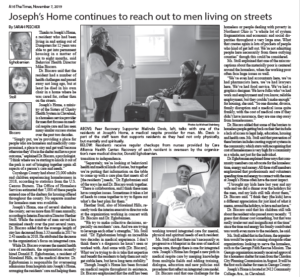Chagrin Valley Times: Joseph’s Home continues to reach out to men living on streets
Thanks to Joseph’s Home, a resident who had been living in and eating out of Dumpsters for 12 years was able to get into permanent housing in a matter of six to eight months, said Behavior Health Director Mike Biscaro.
Dr. Biscaro said that the resident had a number of health challenges and passed away not long ago, but at least he died in his own chair in a home where he was cared for, rather than on the streets.
Joseph’s Home, a ministry of the Sisters of Charity Health System in Cleveland, is a homeless service provider for men that focuses on medical respite care and has seen many similar success stories over the past two decades.
“Simply put, we’re providing a place for people who are homeless and medically compromised, a place to stay and get well because otherwise they’d be in the shelter and have a poor outcome,” explained Dr. Biscaro, a psychologist. “I think where we’re starting to knock it out of the park is sort of bringing together again all aspects of a person’s care and needs.”
Cuyahoga County had about 23,000 adults and children experiencing homelessness in 2018, according to statistics from the U.S. Census Bureau. The Office of Homeless Services estimated that 7,000 of these people entered one of the shelters for housing offered throughout the county. No separate number for homeless men was available.
Joseph’s Home, one of several shelters in the county, serves more than 80 men annually, according to Interim Executive Director Heather Stoll. While the number of men served has remained steady over the past several years, Dr. Biscaro added that the average length of stay has decreased from 3.33 months in 2017 to 2.43 months in 2018. He attributed the decrease to the organization’s focus on integrated care.
While Dr. Biscaro oversees the mental health care of residents, the organization recently hired Donald E. Eghobamien, a resident of Moreland Hills, as the medical director. Dr. Eghobamien is responsible for overseeing admissions from hospitals into Joseph’s Home, arranging the residents’ care and helping them transition to independence.
“Separately, we’re looking at behavioral health and medical kinds of issues, but together we’re putting that information on the table to come up with a care plan that meets all of [the residents’] needs,” Dr. Eghobamien said of the ways he and Dr. Biscaro work together. “There is collaboration, and I think these men have complex issues. Sometimes it takes a lot of heads to come together to try to figure out what’s the best plan for them.”
Heather Stoll, also of Moreland Hills, recently took the interim executive director role at the organization working in concert with Dr. Biscaro and Dr. Eghobamien.
“We try to make collective decisions, especially on residents’ care. And we are trying to leverage each other’s strengths,” Ms. Stoll said. “Dr. Eghobamien brings an incredible two decades in medical experience. I don’t think there’s a diagnosis he hasn’t seen or worked with. And same with [Dr. Biscaro]. What we’re trying to do is take that expertise and benefit the residents to help them not only get stable here, but have long term stability.”
Though Joseph’s Home has been focused on medical respite throughout its existence, Dr. Biscaro emphasized that the staff has been working toward integrated care for mental, physical and spiritual needs of each resident.
Ms. Stoll said that there isn’t necessarily as progressive a blueprint in the area of medical respite care, though there is one for integrated care. Joseph’s Home has forged a new path in medical respite care by merging knowledge from multiple fields and adding training, dialogue, education and new policies and procedures that reflect an integrated care model.
Dr. Biscaro said that one challenge for the homeless or people dealing with poverty in Northeast Ohio is “a whole lot of system fragmentation and economic and social disparities throughout a very large area. What that creates again is lots of pockets of people who kind of get left out. We’re not admitting people here necessarily from these outlying counties” though this could be considered.
Ms. Stoll explained that one of the misconceptions about the materially poor is centered around the homeless, when the working poor often face huge issues as well.
“We’ve even had accountants here, we’ve had pharmacists here, we’ve had lawyers here. We’ve had food service. We’ve had a graphics designer. We have folks who’ve had work and employment and you know, reliable employment, but they couldn’t make enough” for housing, she said. “So one disaster, divorce, family disruption and a medical issue quite frankly, with the cost of medical care if they didn’t have insurance, they are one step away from homelessness.”
Dr. Biscaro added that some of the barriers to homeless people getting back on their feet include a lack of access to legal help, education, housing and health care. Ms. Stoll said that prevention of these barriers includes creating support systems in the community, which starts with recognizing that cost of homelessness is very high for a community as a whole, not just for the individual.
Dr. Eghobamien explained three ways that community members can advocate for the homeless: time, energy and money. All three staff members emphasized that professionals and volunteers spending time and energy to connect with the men at Joseph’s Home often have the most impact.
“I brought my kids here last year and my wife and we did a dinner over the holidays for the men, and my kids still talk about them,” Dr. Biscaro said. “I think they (the kids) have a different appreciation for just kind of what it means, around the holidays, to have and not have.”
Dr. Biscaro said that his children still talk about the resident who passed away recently. “I guess that dinner cost something, but that was really irrelevant and insignificant at the time” since the time and energy his family contributed was worth even more to the residents, he said.
Ms. Stoll added that in the future, the organization would be open to coming alongside other organizations looking to serve the homeless, such as the Geauga Faith Rescue Mission. The Geauga organization recently received approval for a homeless shelter for men from the Chardon City Planning Commission in August. It will be the first such shelter for men in Geauga County.
Joseph’s Home is located at 2302 Community College Ave., in Cleveland.
Written by Sarah Peecher, Chargin Valley Times | Photos by Michael Steinberg




